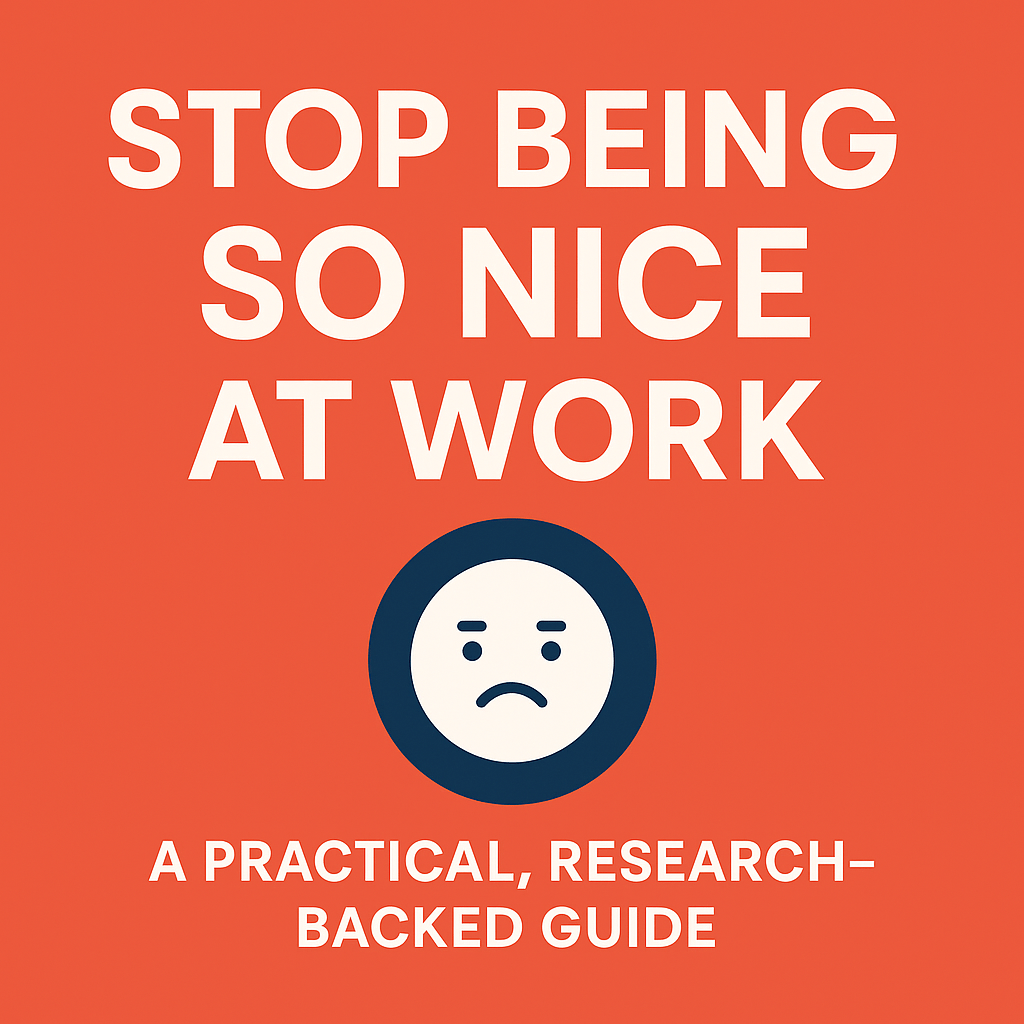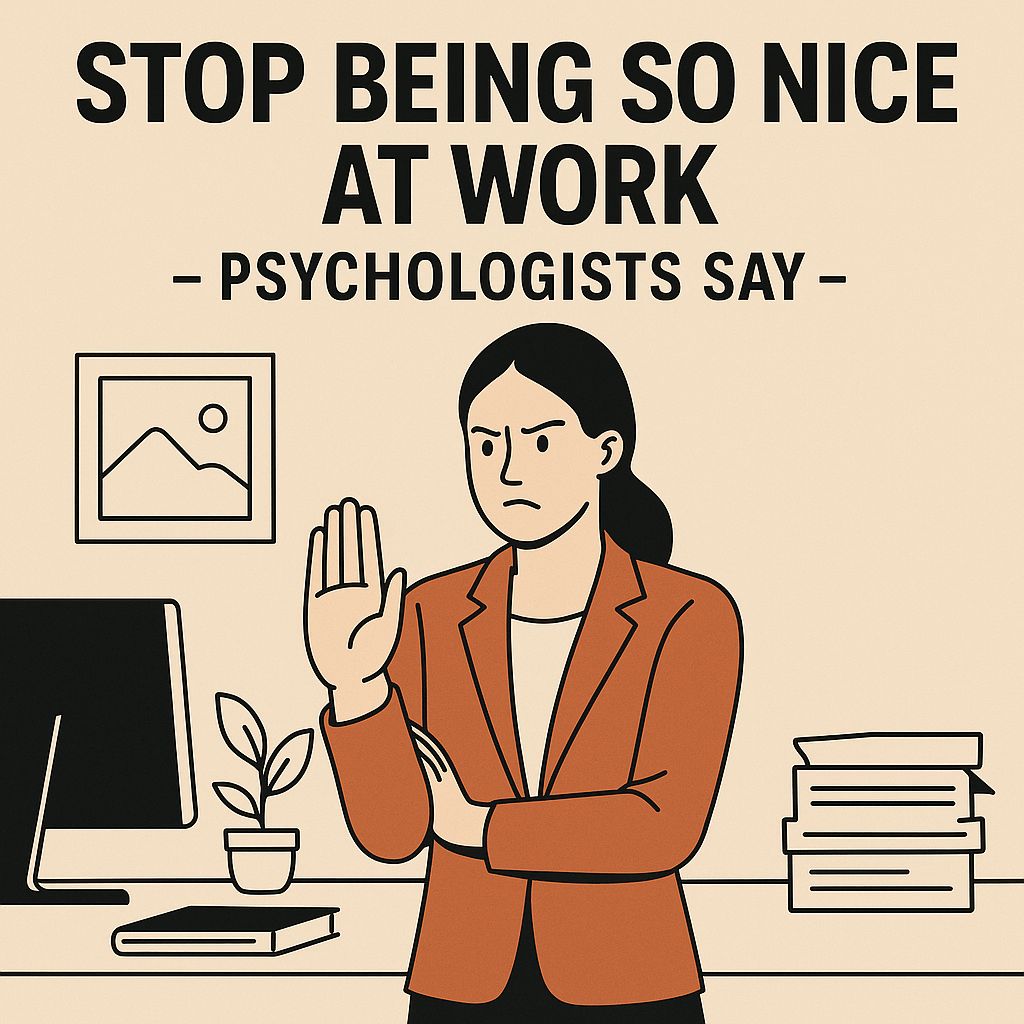- Ark's Newsletter
- Posts
- Stop being so nice at work, psychologists say—and here’s how to do it without turning into a jerk
Stop being so nice at work, psychologists say—and here’s how to do it without turning into a jerk
Being friendly at work is great. But psychologists and workplace researchers warn there’s a difference between being kind and being “too nice”—a people-pleasing pattern that can quietly hurt your credibility, career, and mental health. Below I pull together the evidence, explain why it happens, and give practical steps to stop sabotaging yourself while staying authentic.

What “too nice” actually looks like
“Too nice” at work often shows up as:
Saying yes to extra tasks you don’t have time for.
Giving vague, overly positive feedback instead of specific, useful guidance.
Hiding your preferences or ideas to avoid rocking the boat.
Constantly smoothing conflict rather than addressing it.
These behaviors may feel safe in the short term, but they create problems—both for you and for the team.
The evidence: why being overly nice backfires
It can stall your career. Recent commentary and career analysis argue that a steady “yes” habit—the “yes employee”—can slow promotions and pay growth because it hides leadership potential, undermines perceptions of competence, and leads to burnout.
Overly positive/vague niceness reduces trust and usefulness. Social psychologist Tessa West and other researchers note that people need specific, actionable feedback. When colleagues or managers are only upbeat and non-specific, recipients may distrust the praise or miss the chance to improve—which harms performance and relationships.
People-pleasing harms performance and well-being. Psychology reviews link chronic people-pleasing to stress, anxiety, reduced job satisfaction, and poorer performance because it diverts time and emotional energy away from priorities. It’s also associated with maladaptive interpersonal patterns (e.g., sociotropy, fawning) that come from fear of rejection.
It’s a broader workplace problem—and gendered. Sociological reporting and recent studies describe “likability labor”: many (especially women) feel pressured to perform warmth and agreeableness as unpaid emotional work. That pressure forces people to underplay their competence and dampens innovation.
Organizations are noticing and advising assertiveness. Career coaches and viral conversations (e.g., “professionally mean” / assertive communication trends) reflect a cultural shift: being strategically direct and boundary-oriented is now framed as necessary to get fair credit and work done.
Why we get stuck being “nice”
Psychologically, people-pleasing often springs from:
Fear of rejection or abandonment.
Early conditioning (reward for being compliant).
A desire to avoid conflict or uncomfortable emotions.
Misreading workplace signals (thinking being liked equals job security).
Behaviors that once worked socially become maladaptive in professional contexts where clarity, accountability, and truthful feedback matter.
How to stop—practical, psychologically informed steps
Reframe “nice” vs. “kind.”Kindness is generous and honest; being “nice” can mean you’re prioritizing other people’s comfort over useful outcomes. Aim for kind and clear.
Use micro-scripts to say no gracefully.Short, rehearsed responses reduce anxiety and preserve relationships. Examples:
“I can’t take that on right now—I’m at capacity. If it’s urgent, which task should I deprioritize?”
“I’m not the best person for that; I recommend [name], or I can help find someone.”
Make feedback specific and actionable.Replace vague praise with 1–2 concrete observations and a suggestion: “Nice job” → “Your report covered X well; next time add a one-sentence conclusion so readers get the key takeaway.”
Set time and scope boundaries.Block time, limit recurring favors, and use calendar visibility. If you help often, make the help formal (e.g., “I can help this week, but can we set a limit of 2 hours?”).
Practice assertiveness, not aggression.Assertive communication uses “I” statements, clear requests, and a calm tone. You can be direct without being mean.
Collect objective evidence of your work.Track accomplishments and outputs. When you present clear results, it becomes easier to push back on being overloaded and to claim credit.
Seek allies and mentors.Ask a trusted colleague or manager to call you in when you’re softening your language or taking on too much. An external perspective helps recalibrate behavior.
Work on the underlying fear.If people-pleasing is deep-rooted, therapy or coaching (CBT, ACT, or trauma-informed approaches) can help you change patterns safely.
For managers: how to reduce “too nice” culture
Encourage psychological safety to surface disagreements without penalty.
Train teams to give specific feedback.
Watch for employees who overhelp others at their own expense and redistribute work.
Model boundary setting—leaders who say no create permission for others to do the same.
Bottom line
Being helpful and likeable is a strength—but unchecked niceness becomes a liability when it replaces clarity, accountability, and honest feedback. Psychology and recent workplace reporting recommend swapping reflexive people-pleasing for kind, direct, and boundary-driven behavior so you protect your well-being and your career.
